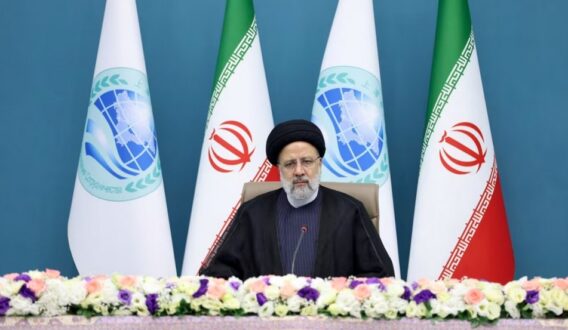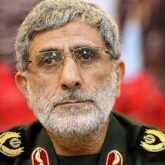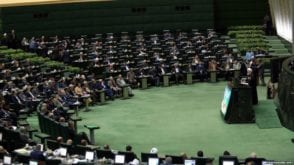iranintl – As the March parliamentary elections in Iran approach, many politicians protest political “purification” efforts by ultraconservatives aimed at monopolizing power.
Even some conservative figures previously branded as hardliners, including Expediency Council member Mohammad Javad Bahonar, expressed concern about the aggressive purging efforts by ultraconservatives, not only within the government but also in academic institutions.
Reformist cleric Hossein Ansari Rad, who served in the parliament in the 1980s, has bitterly said in an interview with Rouydad24 that the advocates of political purification prefer to have a bunch of non-experts around them rather than professional elites.
He also criticized the government for dismissing university professors and replacing them with unqualified individuals. In addition, Ansari Rad criticized the government’s economic policies, stating that instead of functioning as a welfare state, it has created a nation of 80 million people reliant on government handouts to make ends meet.
He expressed regret that despite possessing valuable resources like oil and natural gas, Iran now grapples with severe poverty, pushing the country to the brink of collapse.
Nonetheless, Ansari Rad reiterated that advocates of political purification represent a minority within the government, attempting to monopolize political power in Iran for decades.
He recalled a time when Iran had wise leaders in positions of power and warned that the country is heading toward a deadlock. Currently, the nation’s economic and foreign policy situations are so dire that countries like Oman and Qatar have to assist Iran and mediate with the U.S. to pursue Iran’s interests.
Meanwhile, in an interview with Nameh News conservative commentator Mohammad Mohajeri said that former parliamentary speaker Ali Larijani was a victim of political purification during the 2021 presidential elections when the Guardian Council refused to endorse his qualifications as a candidate, although he is an experienced conservative who has served in many executive positions since the 1990s.
He added that both of Iran’s leading political factions have promoted the idea of their own camp since 1979 whenever they gained dominance in the Iranian political landscape. However, the monopolization of power by ultraconservatives began under former President Mahmoud Ahmadinejad and has persisted since then. Mohajeri reiterated that, in fact, “Ahmadinejad was one of the architects of the concept of political purification.”
He also emphasized the role of President Ebrahim Raisi’s ultraconservative adviser, Saeed Jalili, as one of the masterminds behind political purification. He pointed out that Jalili is a powerful figure, actively involved in both the actual government and the shadow government. Mohajeri also named former Majles Speaker Gholam Ali Haddad Adel as a conservative figure who has played a pivotal role in purging critics and opponents from the establishment.
In another development, former Prosecutor of the Revolutionary Courts in Iran, Ayatollah Seyyed Hossein Mousavi Tabrizi told Rouydad24 that “Those who claim to be revolutionaries harm the trust between the people and government (regime) and make the country’s situation volatile.”
Tabrizi, currently serving as the secretary of the Seminarians Association in Qom, expressed his desire, saying, “I hope that radicals on both sides of Iran’s political spectrum will leave the people alone as we approach the election time.” He also recommended that the Guardian Council refrain from harshly disqualifying candidates, as this could harm the system and lead people to believe that certain groups intend to reserve all Majles seats for insiders.
“Ruthless disqualifications provide no incentive for voters to participate in the elections, and the Guardian Council should be held responsible for the resulting consequences,” cautioned Mousavi Tabrizi. He added, “By abstaining from the previous round of elections, voters conveyed the message that no individual or organization should make decisions on behalf of the people.”
 Shabtabnews In this dark night, I have lost my way – Arise from a corner, oh you the star of guidance.
Shabtabnews In this dark night, I have lost my way – Arise from a corner, oh you the star of guidance.



